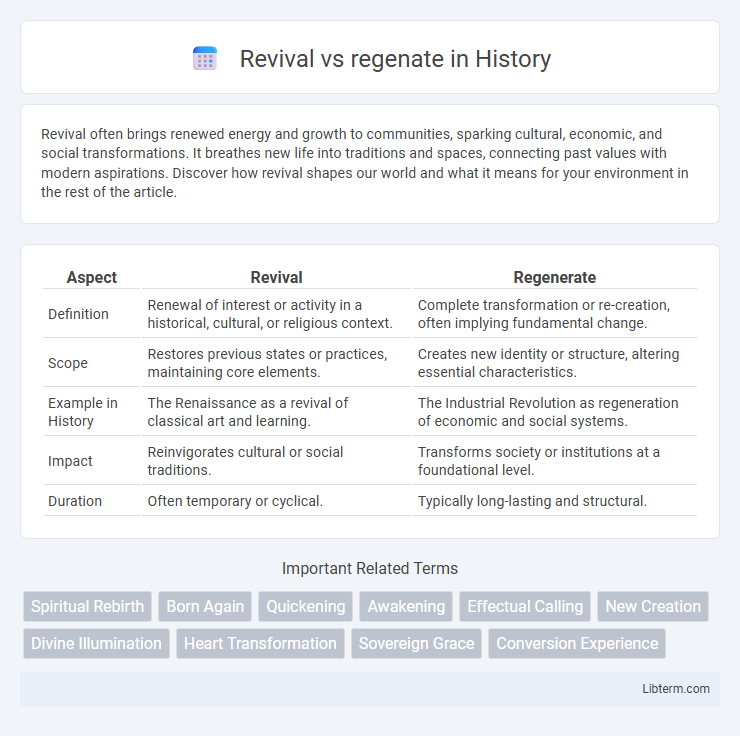Revival often brings renewed energy and growth to communities, sparking cultural, economic, and social transformations. It breathes new life into traditions and spaces, connecting past values with modern aspirations. Discover how revival shapes our world and what it means for your environment in the rest of the article.
Table of Comparison
| Aspect | Revival | Regenerate |
|---|---|---|
| Definition | Renewal of interest or activity in a historical, cultural, or religious context. | Complete transformation or re-creation, often implying fundamental change. |
| Scope | Restores previous states or practices, maintaining core elements. | Creates new identity or structure, altering essential characteristics. |
| Example in History | The Renaissance as a revival of classical art and learning. | The Industrial Revolution as regeneration of economic and social systems. |
| Impact | Reinvigorates cultural or social traditions. | Transforms society or institutions at a foundational level. |
| Duration | Often temporary or cyclical. | Typically long-lasting and structural. |
Defining Revival and Regenerate: Key Differences
Revival refers to a renewed interest or awakening, often in religious or social contexts, characterized by a widespread reawakening of enthusiasm and commitment. Regenerate specifically denotes a fundamental transformation or spiritual rebirth, emphasizing an internal change in character or nature. Key differences lie in revival being a collective, temporary re-energizing event, while regenerate pertains to a permanent, personal renewal at a deep, intrinsic level.
Historical Contexts: Origins of Revival and Regeneration
Revival movements originated in the 18th century, notably with the First Great Awakening in America, emphasizing renewed religious fervor and mass conversions through powerful preaching and emotional experiences. Regeneration, rooted in early Christian theology, refers to the spiritual rebirth or transformation of an individual's soul by divine intervention, a concept extensively developed by theologians like Augustine and later reformers. These historical contexts highlight revival as a communal, outward awakening and regeneration as a personal, inward change in faith.
Theological Perspectives: Revival vs. Regeneration
Revival refers to a widespread spiritual awakening within a community or church, marked by renewed enthusiasm, repentance, and increased activity in worship, often seen as an external movement led by the Holy Spirit. Regeneration, in contrast, is the foundational theological doctrine describing the transformative work of the Holy Spirit in an individual, resulting in the new birth and spiritual rebirth, making a person inherently new in Christ. While revival impacts groups through renewed fervor and collective repentance, regeneration is the personal, inward change essential for salvation and eternal life according to Christian theology.
Revival: Characteristics and Core Elements
Revival is characterized by a sudden, intense spiritual awakening marked by widespread enthusiasm and a collective renewal of faith within a community or congregation. Core elements include passionate preaching, fervent prayer, spontaneous worship, and a heightened emotional response that inspires repentance and commitment. This movement often leads to increased church attendance, revitalized ministries, and a deeper sense of unity among believers.
Regeneration: Process and Spiritual Impact
Regeneration is a profound spiritual process involving the transformation and renewal of an individual's inner being, often described as being "born again" in Christian theology. This process signifies the restoration of a soul's spiritual vitality through the Holy Spirit, leading to a new moral and ethical life aligned with divine principles. Regeneration brings lasting spiritual change, fostering deep personal growth and a sustained connection with God, distinguishing it from the more transient awakening experienced in revival.
Signs and Evidence: Revival Compared to Regeneration
Revival is characterized by a widespread, often sudden renewal of interest and participation in spiritual activities, marked by visible enthusiasm, emotional responses, and public testimonies. Regeneration refers to an individual, internal transformation involving the spiritual rebirth of a person, evidenced by lasting changes in character, moral behavior, and a newfound sense of purpose. Signs of revival include collective worship gatherings and societal impact, whereas regeneration is primarily demonstrated by personal conviction and ethical renewal.
Role of the Holy Spirit: Revival and Regeneration Explained
The role of the Holy Spirit in revival emphasizes empowering believers for collective renewal and spiritual awakening within a community. In regeneration, the Holy Spirit acts internally to transform an individual's heart, bringing them from spiritual death to new life in Christ. Both processes involve the Spirit's work, but revival focuses on widespread revitalization, while regeneration centers on personal salvation and rebirth.
Personal Experience: Testimonies of Revival and Regeneration
Testimonies of revival often highlight a profound collective awakening marked by renewed faith and communal spiritual growth, while accounts of regeneration emphasize individual transformation characterized by a deep, personal renewal of the soul. Personal experiences of revival frequently describe intense periods of worship, unity, and societal impact, whereas regeneration narratives focus on inner change, repentance, and the beginning of a new life in Christ. Both phenomena are central to Christian spirituality, representing distinct but interconnected processes of divine intervention and spiritual rebirth.
Misconceptions About Revival and Regeneration
Misconceptions about revival and regeneration often confuse the two as identical spiritual experiences, whereas revival refers to a corporate awakening impacting a community, and regeneration is an individual's spiritual rebirth. Revival entails renewed spiritual interest and increased religious activity within a group, while regeneration involves a personal transformation through the Holy Spirit resulting in new life. Understanding these distinctions clarifies their unique roles in spiritual growth and prevents conflating collective revival with individual renewal.
Lasting Effects: Revival vs. Regeneration in Modern Faith
Revival in modern faith often triggers temporary spiritual awakening marked by intense emotional experiences and communal renewal that may wane without ongoing engagement. Regeneration refers to a profound, enduring transformation at the individual's soul level, emphasizing a permanent change through divine intervention and sustained spiritual growth. The lasting effects of regeneration typically result in continuous moral renewal and deeper relationship with God, distinguishing it from the episodic nature of revival.
Revival Infographic

 libterm.com
libterm.com